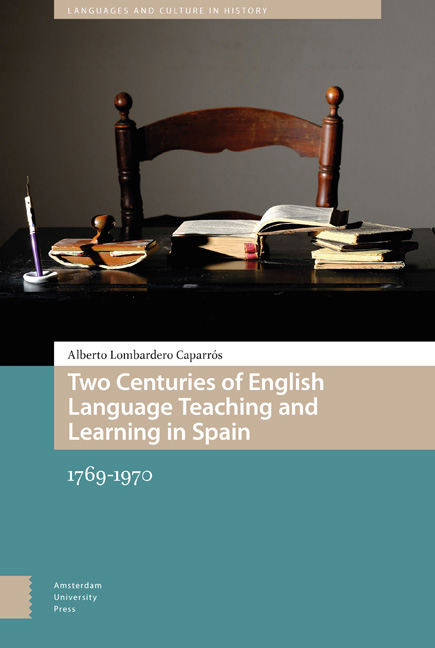Introduction: The Historiography of FLT
Published online by Cambridge University Press: 21 November 2020
Summary
Abstract
Introduces the main principles underlying the historiography of foreign language teaching and learning. Firstly, the chapter includes a historical overview of the most relevant academic literature in order to illustrate some of the principal approaches to this discipline in both national and international traditions. Secondly, it provides a comprehensive retrospective specifically of the Spanish tradition of the history of English language teaching and learning, from its origins in the 1960s up to the present. Lastly, a full account of the methodology pursued in the rest of the book is given. Due to the multiple variables this type of research entails, we have opted out for an eclectic methodology which mainly revolves around a synchronic and diachronic study, including off-the-beaten-track sources such as historical journalism and personal accounts.
Keywords: ELT history, Spain, methodology, eclecticism
The significance of the historiography of foreign language teaching
Over the last few decades there has been a growing interest in the history of foreign language teaching (FLT), judging by the increasing number of publications in this field. To some extent, the recent consolidated influence of applied linguistics as an independent scientific discipline accounts for this interest in the historiography of foreign language teaching. Mackey (1965), Titone (1968), Stern (1983), Puren (1988), and Caravolas (2000) regard history as one of the fundamental mainstays of FLT. Titone (1968, 2) claims that ‘history can give us a perspective’ whereby past experiences can illustrate present trends in teaching as well as a criterion whereby the historically informed language teacher may assume a more critical view in relation to modern problems and solutions. Stern (1983, 76) believes that there is a paucity of studies in the historiography of language teaching: ‘Unfortunately the current state of historical documentation is far from satisfactory. Language teaching theory has a short memory’. Van Els et al. point out the future guidelines for a more factual and objective study of the historiography of FLT:
Historical descriptions frequently have the unfortunate tendency to develop into broad abstractions […] Especially if the space available is limited, […], there is a danger that the historical reality will be distorted.
- Type
- Chapter
- Information
- Two Centuries of English Language Teaching and Learning in Spain1769–1970, pp. 11 - 24Publisher: Amsterdam University PressPrint publication year: 2019



